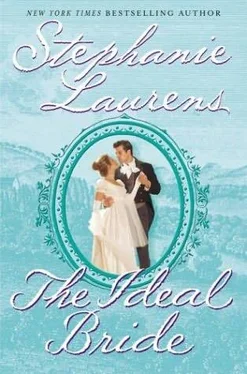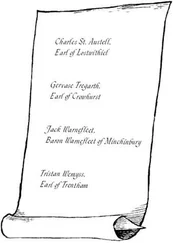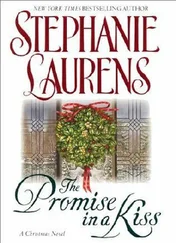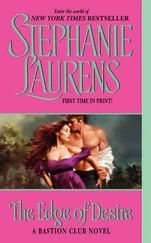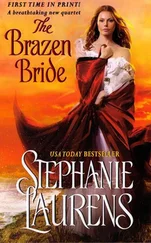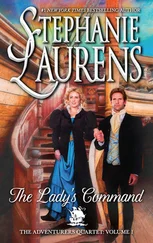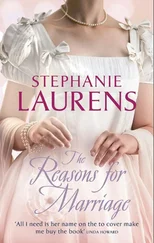Hearing her footsteps on the stairs, he shut the tome and returned it to the shelf. Mentally adding Breckenridge at the top of the list of things he intended to investigate tomorrow, he headed for the front hall.
Caro wasn’t at all sure how she felt about Michael being jealous of her association with Timothy. From observation, she knew jealous males tended to dictate, to restrict, to try to hem women in; she was, to her mind sensibly, wary of jealous men. However…
She’d never had a man jealous over her before; while irritating in some respects, it was, she had to admit, rather intriguing. Subtly revealing. Interesting enough for her to endure Michael’s silence all the way to the Osterleys‘. He wasn’t sulking; he was brooding, thinking— about her more than Timothy.
Yet when they reached the Osterleys’ and he stepped down, then handed her down, she was conscious of his attention focusing dramatically. On her. As they went up the steps, greeted their hostess, then moved into the drawing room to join the other guests, regardless of his occupation, that’s where his attention remained. Locked, squarely, on her.
Far from annoying her, she found being the cynosure of his attention quite enjoyable. Having a man jealous over one wasn’t all bad.
The Osterleys’ drawing room was awash with blue political blood. Aside from all the usual suspects, the gathering included Magnus, who had come ahead of her and Michael, Michael’s aunt Harriet Jennet, and Therese Osbaldestone. Devil and Honoria were there, too.
“Lord Osterley is distantly connected to the Cynsters,” Honoria told her as they touched fingers, brushed cheeks.
There were few among the company Caro did not know; she and Michael spent a few minutes with Honoria and Devil, then both couples moved on, as all were expected to, to converse, reestablish and strengthen ties. This group formed the political elite, the ultimate power in the land. All sides of politics were represented; although government men might presently wield the whip, all accepted that that would at some election in the future change.
Renewing acquaintances, making new contacts—exchanging names, learning faces, noting to which clubs each gentleman belonged, his present position, and, although never stated aloud, his ultimate ambition—that was the unabashed purpose of the gathering. Such congresses of the powerful were held two or three times a year—there was rarely need for more; those who attended had long memories.
Gaining the far end of the drawing room, Caro glanced back, estimating, considering.
“What?” Michael asked, leaning close.
“I was just thinking it’s a goodly crowd, but one selected with care.” She met his eyes. “Not even all Ministers are present.”
“Some”—taking her elbow, he guided her on—“have blotted their copybook. Others are, much as it pains me to admit, hidebound— they’re not amenable to change, and change most definitely is in the air.”
She nodded; over the past two years, freed of the necessity of concentrating on Portuguese affairs, she’d been monitoring political vicissitudes nearer to hand. Plebiscite reform was only one of a multitude of challenges staring the government in the face.
It would no longer be enough to govern by default; the times—the immediate future—called for action.
Diplomacy and politics were old bedfellows; her experience in one arena stood her in excellent stead in the other. She encountered no difficulty moving through the throng, charming and allowing herself to be charmed, interacting and absorbing all that her questions and comments drew forth.
Michael needed no help in this sphere, no prompting, no direct assistance; he was more at home here than she was. He could, however, use a foil, one who comprehended not only words but their nuances, who could artfully extend a topic or introduce a new one, seeking more, revealing more.
As they left Lord Colebatch and Mr. Harris from the War Office, Caro caught Michael’s eye. The smile they exchanged was brief, and private. He leaned closer. “We make an exceptional team.”
“Colebatch didn’t want to tell you about his association with the new railway.”
“He wouldn’t have if you hadn’t asked—how did you know?”
“He was uncomfortable the moment Harris mentioned the subject—there had to be a reason.” She glanced up, met his eyes. “And there was.”
He acknowledged her astuteness with an inclination of his head, and steered her on to fresh fields.
As usual with such gatherings, the time in the drawing room before the meal was extended, and even after they were all seated about the long board, the conversation remained scintillating and sharp. At such a dinner, food wasn’t the main course. Information was.
Ideas, suggestions, observations—all had their place; in this company, all were treated with respect. Visually, the scene was glittering, gorgeous, subtly and pervasively elegant, outrageous only in its undeniable worth, the gold-plated cutlery, the Sevres dishes, the crystal flashing in poor imitation of the diamonds circling the ladies’ throats.
They all noticed, yet were barely aware. To a person, their attention remained riveted on conversation—on why they were there.
Caro found it tiring, yet exhilarating. It had been more than two years since she’d attended such an event. To her surprise, her enthusiasm, her enjoyment of the rapierlike cut-and-thrust of comment and dialogue, of witty repartee, all swirling and dipping and connecting, hadn’t died; if anything, her delight in participating and succeeding had grown.
Toward the end of the meal, when for a moment she sat back and sipped her wine, and caught her breath after an extended and quite hilarious exchange with George Canning, she caught Lady Osterley’s eye. Seated at the far end of the table, her ladyship, one of the great hostesses, smiled, inclined her head, and lifted her glass in a silent toast of patent approval.
Caro smiled back, wondered, then allowed her gaze to travel the table. Realized, confirmed, that each recognized hostess—each recognized power—was spread among the guests so that each could command a section of the table, ensuring no group did the unthinkable and let conversation die.
She had been included in the roster of female powers.
Her heart tripped, gave a definite jump of joy, of very real satisfaction.
Five minutes later, Lady Osterley rose and led the ladies back to the drawing room, leaving the gentlemen to discuss parliamentary business over their port.
The ladies had other issues to address, ones equally relevant.
Entering the drawing room toward the rear of the female crowd, Caro found Therese Osbaldestone waiting to waylay her. Taking her arm, Therese nodded to the long windows left open to the balcony. “I need some air—come and walk with me.”
Intrigued, Caro matched her steps to Therese’s slower ones as they crossed the wide room. As always, Therese was supremely well dressed in a high-necked maroon silk gown. Rings flashed on her gnarled fingers as she moved her cane; she used it sparingly.
Content with her own appearance, with her skillfully draped eau de nil silk and the carved green amber set in silver that adorned her throat and wrists, Caro followed Therese onto the narrow balcony. They had the space to themselves, as, she was certain, Therese had intended.
Hooking the ornate silver head of her cane over one arm, Therese gripped the balcony rails and studied her. Consideringly.
Caro met that black stare, one she knew disconcerted others— indeed, was intended to disconcert—with unruffled serenity.
Therese’s lips curved; she looked out over the darkened gardens. “Most others would be apprehensive, but of course you’re not. I wished to compliment you on your good sense.”
Читать дальше
